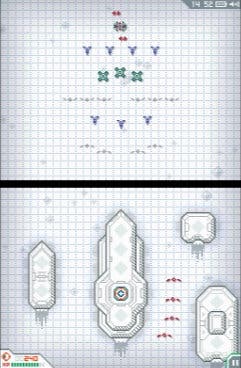Starship Patrol
Tower of Babel defence.
As with all Tower Defence titles, as the game progresses so the number of different weapon types on offer scales up. Pleasingly, Q-Games has managed to keep the options tight and focused, and each one different enough from the next to justify its inclusion in the armory.
In addition to turrets there are also a few 'Advanced' weapons, which must be purchased using a different type of currency: crystals, one of which is earned per round completed. Advanced weapons use different slots on the game board to standard weapons, and their effects - such as a tractor beam, used to slow down passing fighters - are less directly offensive, instead combining with your standard turrets to maximise each's effect. Carefully balancing the use of turrets and advanced weapons is wherein Starship Patrol's challenge lies, and it's one that rarely grows tiresome over the course of the game.
Your ships have an aggregated health bar which ends the game when depleted. However, if you're running low on health it's possible to 'play' an SOS card, which will either call in support from a bounty hunter, replenish your total health or add more funds to the pot. You're given a new SOS card at the end of each of the game's 30-odd stages, but, as using one negates the possibility to achieve a perfect rating for a level, their use is discouraged enough to make them a last resort rather than a first port of call.

As with Reflect Missile, the potency of the package derives from its forced limitations. The palette of turrets on offer is deliberately small, the number of turret positions restricted and the economy balanced in such a way as to make almost every purchase critical to the success (and extent thereof) of each stage.
This can give the illusion that there's only a limited set of 'solutions' for each stage, but Q-Games has balanced these to perfection, allowing just enough spread of possible victory conditions, with enough potentials of failure to make for an engaging challenge. By the endgame you get the feeling you have more ways to successfully complete a level than in, say, Plants vs. Zombies, which had a more obvious and restricting solution to its latter stages.
Starship Patrol presents a package of rare calibre on DSiWare, a game that, through its tight breadth and expansive depths, would make for a worthy defining title on a service still trying to find its identity. Sadly, it seems as though Nintendo is unwilling to let anything in particular define DSiWare, its chaotic catalogue of dissimilar experiences lacking in cohesion or order. More's the pity, as Q-Games' titles not only deserve recognition and accolade, but also a chance to influence other developers with their pithy expression of all that a downloadable handheld game should be.
